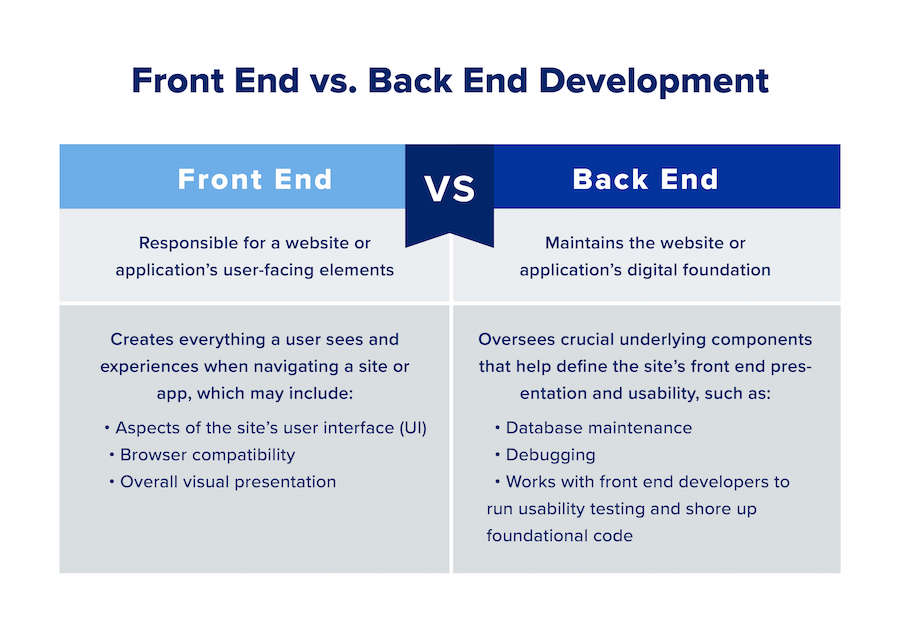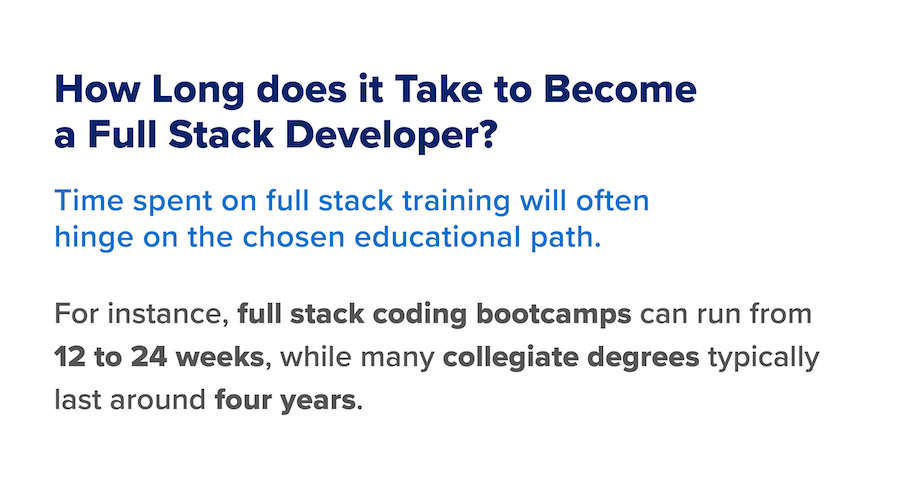What Is a Full Stack Developer? (And the Skills They Need)

Full stack developers are perhaps some of the most highly regarded professionals within the field of web development, but what is a full stack developer? Broadly speaking, they are web developers equipped to work with a digital entity’s front and back ends, meaning they are usually skilled with aspects of computer programming, user experience (UX) design, project management, and in many cases, client communication. This specialized hybridization has generally increased the demand for full stack developers in a variety of professional capacities.
What is full stack web development?
Full stack development refers to web development taking place in both the front and back ends of a website. In other words, the process may involve a combination of underlying database work, user-facing website construction, and client-focused communication aimed at the planning and maintenance of projects (among many other responsibilities).
Are you interested in pursuing a career in full stack development? See our complete guide on becoming a full stack developer or request info from our full stack coding bootcamp to learn the necessary skills in as little as 12 weeks while building a robust portfolio of projects to show potential employers.
Throughout this article, we’ll take a closer look at the full stack developer profession, including primary job responsibilities, crucial full stack developer skills, and options for learning the craft on your way to an exciting new career. We’ll also explore a few potential career paths for aspiring full stack developers.
Understanding the Role of Full Stack Developers
Full stack developers merge front end and back end web development skills, tackling a wide variety of tasks in building and maintaining a digital entity (e.g., app, web page). The position is predicated upon versatility, innovative thinking, and a blend of technical programming knowledge and high-level client communication.
Before they can apply their diverse skill set, however, aspiring full stack developers must first learn the distinction between front end and back end development, becoming versed in both fields to properly balance their array of responsibilities:
Front end development
Front end developers are responsible for a website or application’s user-facing elements. These may include aspects of the site’s user interface (UI), browser compatibility, and overall visual presentation. In other words, these developers create everything a user sees and experiences when navigating a site or app. Front end development tends to utilize programming languages like JavaScript, HTML, and CSS to make projects more engaging and interactive.
Back end development
Meanwhile, back end developers maintain the website or application’s digital foundation. Think of them as a stage crew working behind the scenes of a concert. Back end developers oversee crucial underlying components that help define the site’s front end presentation and usability — such as database maintenance and debugging. They also work with front end developers to run usability testing and shore up foundational code as needed.
Back End vs. Front End Development
Back end developers work within a website or application’s underlying digital framework — they maintain databases, write and debug foundational code, and address factors contributing to speed and efficiency. Meanwhile, front end developers oversee a digital entity’s client-facing properties, including its user interface (UI), browser compatibility, and overall aesthetic presentation.

Typical Job Description of Full Stack Developers
Because they have proficiency working with both sides of development, full stack developers handle quite a bit of responsibility in a site or application’s cohesive development and maintenance. Indeed offers a comprehensive job description for the full stack developer role, which includes duties like:
- Testing changes made to previously developed programs.
- Managing the full life cycle of software or applications, from initial conception to launch.
- Upgrading and fine-tuning software and applications beyond their deployment.
- Compiling feedback for site managers throughout the development process.
Additionally, full stack developers commonly oversee front end architecture and back end programming; they also perform cross-platform optimization for a variety of digital mediums (desktop, mobile, etc.) Beyond their technical duties, developers are also responsible for collaborative planning in tandem with other company departments; they are also regularly given managerial responsibilities in leading the broader development team.
11 Useful Skills & Languages for Full Stack Developers
The full stack developer role hinges on a wide variety of skills — many of which require at least some fluency in different key programming languages. That said, the following are a handful of important skills and languages aspiring full stack developers should learn:
Python
Since Python is one of the leading programming languages for modern back end web development, it’s equally valuable for those interested in full stack development. The language is favored not only for its versatility, but also for its relative simplicity. In fact, Stack Overflow’s 2020 Developer Survey found that Python was the most wanted programming language by a considerable margin, thanks to the fact that it supports many different programming styles and is particularly efficient in data visualization.
JavaScript
JavaScript is another consistently valuable coding skill in full stack development, ranking beneath Python as the second-most desired language amongst Stack Overflow’s surveyed developers. Like Python, JavaScript is regarded for its dynamic array of uses, and in web development, these generally apply to the depth and quality of a web page — namely by allowing developers to make complex style declarations, support high-level math calculations, and reference content from other web pages. Without JavaScript, sites would be more static, less animated, and ultimately less engaging.
HTML
HTML (HyperText Markup Language) is one of the most widely used coding languages in web development. As a markup language, it refers to the ways in which web pages are linked together and is primarily used to inform a web browser of how to display a web page’s elements via tags. For instance, thetag represents a digital document’s displayed header, potentially containing other tags related to information like a title or relevant link.
CSS
Along with JavaScript and HTML, CSS (Cascading Style Sheets) is consistently one of the most-used coding languages in front end development, making it an asset to the full stack role. CSS is primarily used to create an aesthetically pleasing design — specifically the color- and style-based code added to HTML structural elements. For example, a background-color: lightblue element would set the site’s user-facing background to light blue.
SQL
SQL (Structured Query Language) is used in a variety of databases, and it is commonly applied in back end development. The language is mainly used to manage and update records, and access and change databases. Since nearly every website makes use of back end data storage, SQL provides a solid foundation in database-oriented literacy needed in full stack development — especially regarding software built to house sensitive data.
Rust
Rust is also a highly regarded programming language used in web development, ranking as Stack Overflow’s “most loved” language per its 2020 survey. Rust is commonly used to improve a web page’s speed, parallelism, and inherent memory safety, and it too is valued for its wide range of uses. These include game engine design, operating system construction, and browser component implementation.
Java
Java tends to rank highly among many top programming language rankings and surveys. This general-purpose language is primarily used in back end web development, and can be applied to a wide variety of different software types. It is imperative for full stack developers to learn languages like Java, as they can be applied to countless scenarios in application construction, maintenance, and conceptualization.
Web Architecture
Website architecture involves the planning and design of the technical, functional, and visual components of a website (before it is deployed). It’s used by website designers and developers as a means to design and develop a website. Because of this, full stack development goes hand in hand with web architecture — full stack developers must know how back end data is structured to efficiently build a strong cohesive product, and should learn how to separate files and where to perform specific computational tasks.
Critical Thinking
Web development is nearly synonymous with high-level problem solving — meaning that developers are usually expected to be skilled critical thinkers. A development project can often present an array of challenges, from software limitations to back end bugs, and developers should be prepared to navigate these matters with a comprehensive, solution-oriented mentality, improvising and trying unconventional approaches when necessary. Such thinking not only helps bring a project to fruition, but can also drive the growth of the collective web development team, setting a standard of tenacity and innovation for future projects.
Patience
Patience comes as a natural companion to critical thinking in web development. Developers should remain calm and proactive (both with themselves and with team cohorts) when troubleshooting and trialing experimental ideas. A solution to a complex issue is not always immediately evident, and a little patience can go a long way in sustaining these efforts and making a breakthrough. This skill is especially important for new developers, as they will often need additional time to find their footing in the industry.
Communication
Communication is another crucial soft skill full stack developers must possess to perform their job well. On any given day, developers may need to coordinate with clients, coders, domain managers, and other internal departments as they navigate their own responsibilities — and since some of these individuals may not be as tech-savvy, clarity and transparency are a must. Web development commonly is a collaborative effort, and honing this mentality can position new full stack developers and their cohorts for lasting success.
3 Options for Learning Full Stack Development
Though full stack development is a high-level, multifaceted field, aspiring developers can master the knowledge needed without previous experience. What’s more, there are several time-tested educational pathways for those interested in learning full stack skills — these commonly boil down to bootcamp courses, applicable college degrees, and self-taught learning options.
Coding Bootcamps
Coding bootcamps are among the most effective methods for learning front and back end development skills. These courses offer the chance to learn web development through practical instruction, making use of flexible, intensive curricula to prepare learners for a career in full stack development. No two bootcamps are the same, which is indicative of both their personalization and level of detail in a given concentration.
College Degrees
Like bootcamp courses, traditional college degrees offer the chance to learn industry-specific skills — but through applicable degree paths. Aspiring full stack developers may pursue degrees in fields like computer science or graphic design, giving themselves the chance to learn about both web development and the broader industries housing it.
Self-Taught Options
For those interested in learning with less structure and more autonomy, self-taught options may be a viable pathway. These options could include free online courses, educational apps, and other self-guided methods for learning web development — most of which allow learners to hone their skills at their own pace and on a fully personalized schedule.
How Long Does it Take to Become a Full Stack Developer?
The amount of time you spend learning full stack development will often hinge on your chosen educational path. For instance, a full stack coding bootcamp like Columbia Engineering Coding Boot Camp can run from 12 to 24 weeks, while many collegiate degrees typically take around four years to complete. The duration of self-taught options, on the other hand, can vary depending on the individual or medium of study.

Full Stack Development Career Options
According to the U.S. Bureau of Labor Statistics (BLS), the broad web development and design industry is expected to see an 8 percent employment increase by 2029, and this makes full stack developers particularly valuable job candidates in an already growing field. As more companies shift to predominantly digital infrastructure, the need for high-level web developers has increased hiring for roles such as:
Computer and Information Systems Manager
Computer and information systems managers are jacks of all trades for an organization’s computer-related activity, spearheading everything from network analysis and software maintenance to service-related negotiation with the organization’s technology vendors. As much of the role is rooted in both front and back end elements, full stack developers may be strong candidates for the job.
The BLS reports a 10 percent projected job growth for computer and information systems managers by 2029, and the industry saw a median salary of $151,150 in 2020.
Software Developer
Software developers create the digital applications we use on a regular basis. These could include websites, mobile apps, or video games. The job’s primary responsibilities include designing all pieces of an application or system, working alongside programmers to establish the ideal code for a pending project, and analyzing and applying user needs to future projects. Full stack developers are commonly well-equipped to handle this mesh of tasks, possessing both the development and communication skills that define success in the role.
According to the BLS, software developers received a median salary of $110,140 in 2020, and the industry is projected to see 22 percent employment growth by 2029.
Information Security Analyst
As one of the fastest-growing technology professions, information security analysis is a fantastic career path for those versed in full stack development. These professionals are tasked with developing and implementing network cybersecurity standards, conducting back end penetration testing to identify network weaknesses, and utilizing firewalls and data encryption programs to safeguard sensitive information. Cybersecurity is an inherent cornerstone of full stack development. Developers must be prepared to test and secure the projects they build and oversee, and this can make them ideal candidates for information security analysis jobs.
Information security analysts received a 2020 median salary of $103,590, and by 2029, industry employment is projected to grow by 31 percent.
Computer Support Specialist
Computer support specialists are important IT figures within countless industries, as many businesses require high-level technical support to keep their internal processes fluid and organized. These professionals are often responsible for testing and evaluating existing computer networks, performing regular maintenance to ensure optimal network performance, and troubleshooting errors en route to a stronger network design. Full stack developers may experience a seamless transition into a support specialist role due to their strong, multifaceted knowledge of networks’ and domains’ underlying framework — and their internal communication skills can come in handy when discussing IT matters and educating less tech-savvy team members.
The BLS reports a projected 8 percent employment growth rate for computer support specialists by 2029. In 2020, the industry saw a median salary of $55,510.
Graphic Designer
Since graphic design is a common broad educational gateway to full stack development, the field is, by default, a strong career path for full stack developers. Full stack skills are usually on full display in a graphic design role, with typical tasks including software creation and design, design review and troubleshooting, and project-focused communication with both clients and art directors.
Collectively across all applicable industries, the BLS projects a 4 percent decline in graphic design employment by 2029. However, this outlook varies heavily by industry — for instance, graphic design employment in computer systems design and related services is expected to grow by 2029 despite cross-industry projections.
Job Market & Salaries for Web Developers in New York Compared to U.S. Average
As noted earlier, the U.S. web development and digital design industry (which includes full stack developer roles) is projected to see above-average employment growth by 2029, with over 13,000 new jobs expected to open in that time. Professionals in this field received a median annual pay of $77,200 in 2020, according to national data from the BLS. Of course, a number of factors influence salary, including the individual’s skill set and years of experience, as well as the type and size of the company.
These positive trends are also evident in the New York web development market. According to CareerOneStop, the 2020 median salary for New York-based web developers was $76,450, which comes in just beneath the national average. Meanwhile, the BLS reported 12,950 new job openings for the field in New York during 2020, with the New York-Newark-Jersey City, NY-NJ-PA metropolitan area recording 13,380 job openings during the same year.
Summary
Full stack development is a challenging but rewarding role that combines crucial front and back end responsibilities, making it applicable to a wide variety of technology jobs — many of which sport above-average compensation and long-term employment projections. Learning this vital craft may seem daunting to the uninitiated, but it is possible through a variety of applicable educational pathways. For instance, aspiring developers can enroll in a bootcamp course, as such options are a great way to learn full stack fundamentals in a flexible, personalized manner. Alternatively, these individuals could consider a traditional college degree in a field like computer science or graphic design — or they may seek out self-guided learning options via free courses or similar resources.
For further reading on learning full stack fundamentals, consider starting with our guides on how to become a web developer and how to become a coder online.

 Live Chat
Live Chat